#Brass Threaded Insert
Explore tagged Tumblr posts
Text
Brass Turning Parts Manufacturers and Exporters in India, Australia, Canada, UK
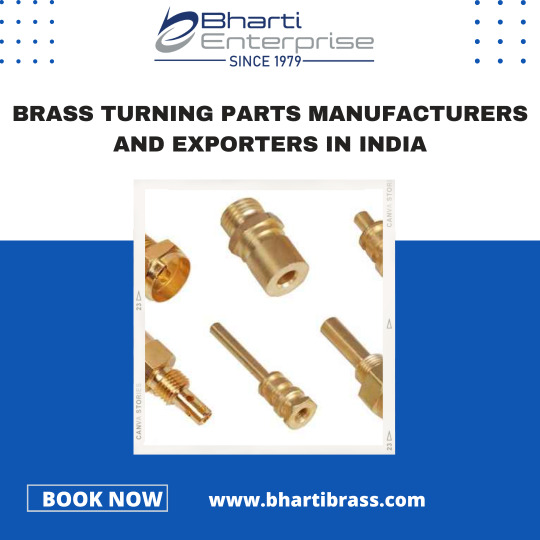
When it comes to precision engineering and manufacturing, few materials match the versatility and durability of brass. With a history that dates back centuries, brass has been a go-to choice for producing a wide range of components, from decorative hardware to intricate mechanical parts. However, the key to harnessing the full potential of brass lies in the hands of custom brass-turned parts manufacturers and suppliers in USA, Europe, UK, Canada, Russia, Australia and South Africa.
In this article, we’ll delve into the world of Custom Brass turned parts manufacturers in USA, Europe, UK, Canada, Russia, Australia and South Africa, exploring the significance of these specialized manufacturers and the role they play in various industries.
Parts turned bras are important for countless applications, from plumbing and musical instruments to automotive components and electrical connections. The accuracy and precision in the metal conversion process make them essential for achieving the desired results in these industries. So, what are custom turned brass parts, Brass Threaded Insert, and why are they so important?
Custom brass turned parts are precisely machined components made from brass, a metal alloy composed primarily of copper and zinc. These parts are crafted with meticulous attention to detail, often on specialized machinery called CNC (Computer Numerical Control) lathes. This precision machining process transforms brass rods or bars into a variety of shapes and sizes, meeting the specific requirements of clients.
The most important elements of Brass Terminals | Brass Connectors based on their appearance. They can be designed and manufactured to great detail, ensuring that they fit perfectly into the intended application. Whether it’s a special plumbing fixture, a critical electrical connection, or a critical infrastructure component, custom metal parts turn out to be essential to get the job done perfectly and efficiently.
THE ROLE OF CUSTOM BRASS TURNED PARTS MANUFACTURERS
Expertise in Material Selection: Brass Turning parts manufacturers and Exporters in Jamnagar, India are well-versed in different brass alloys. They understand the unique properties of each alloy and can recommend the most suitable one for a particular application. This expertise ensures that the final product will have the desired strength, corrosion resistance, and aesthetic appeal.
Precision Machining: These manufacturers utilize advanced CNC machining technology to transform brass raw materials into precise components. This precision is vital, especially in industries where the slightest deviation can lead to malfunction or inefficiency.
Customization: One of the primary advantages of partnering with custom brass turned parts manufacturers is the ability to customize components. They can produce parts with intricate designs, tight tolerances, and various finishes to meet specific requirements.
Quality Assurance: Manufacturers of Custom Brass turned parts manufacturers and exporters in India, USA, Europe, UK, Canada, Russia, Australia and South Africa. to strict quality control measures. This ensures that each component meets the highest standards of quality and durability. This is especially crucial in industries like aerospace and automotive, where safety and reliability are paramount.
Cost Efficiency: While custom manufacturing may seem expensive, it often leads to cost savings in the long run. Custom brass turned parts can be optimized for efficiency, reducing waste and enhancing overall performance.
THE SIGNIFICANCE OF BRASS TURNED PARTS SUPPLIERS
Manufacturers alone cannot meet the diverse and ever-changing needs of various industries. This is where brass turned parts suppliers in Gujarat India, come into play. These suppliers act as a bridge between manufacturers and end-users, offering several crucial advantages:
Wide Range of Inventory: Brass Threaded Inserts suppliers maintain extensive inventories of standard and custom components. This means that customers can quickly source the parts they need without waiting for production lead times.
Reduced Lead Times: For urgent projects or unexpected component failures, brass turned parts suppliers in India provide fast access to replacement parts, reducing downtime and minimizing disruptions.
Cost-Effective Sourcing: Suppliers often benefit from economies of scale, allowing them to offer competitive pricing on both standard and custom components.
Expert Guidance: Suppliers have in-depth knowledge of brass turned parts, Brass Fittings | Brass Sanitary Parts and can assist customers in selecting the right components for their applications. This expertise helps customers make informed decisions.
Reliability: Established Brass Terminals | Brass Connectors manufacturers in USA, Europe, UK, Canada, Russia, Australia and South Africa, have a reputation for reliability and quality. Customers can trust that the components they receive will meet their specifications and perform as expected.
Custom brass turned parts manufacturers and suppliers in India are the unsung heroes of many industries. Their expertise, precision machining capabilities, and commitment to quality ensure that critical components meet strict specifications and perform reliably. As industries continue to evolve and demand ever more specialized components, the role of these professionals becomes even more significant. In essence, they are the artisans crafting excellence from brass, enabling progress in countless fields.
1 note
·
View note
Text
Top-Quality Brass Inserts for Plastic Injection Molding
GK Metals is a leading manufacturer, supplier and exporter of brass inserts for plastic injection molding in Jamnagar, India. We provide high-quality, precision-engineered brass moulding inserts including insert nuts, heat-set threaded inserts, and brass threaded inserts for plastic and woods.

#brass inserts for plastic injection molding#brass threaded inserts for wood#brass knurling inserts#brass threaded inserts#brass insert for plastic#brass moulding inserts#brass molding inserts in india#brass injection moulding inserts#brass insert#brass insert manufacturer in jamnagar#brass insert manufacturer#brass inserts supplier
0 notes
Text
Truth be told, this apocalypse had been more than a little vindicating for Rayna.
The Vatican's secret monster-hunter society, The Knights of True Cross, were having press conferences every few days. The ungrateful papists that excommunicated her grandfather for slaying a possessed cardinal during televised Sunday mass were right there, live-streaming to social media, talking about the demonic threat.
In terms of explicit confirmations, it might've only managed a notch lower than a runaway stumbling across a symbiotically-possessed warlock in the midst of a breakdown, and that invisible heraldic enfield he'd been clutching happily nibbling her arm and inflicting temptaint.
Monsters were real, and Dad was never crazy. Mom finally saw after bringing Kelly home to nibble her, too. Gavin's seeing that now, with the Veil ripped away.
Rayna's estranged warlock-turned-demon mentor visiting while she slept to replace her bracelet with a key that only traveled between university and Mom's house in Scotland had been an unsubtle (and hurtful) way of telling her to sit tight and keep out of things.
She'd caught a thread online, a news clip of an exorcist inserting a similar key into a door, which had prompted her to realize the only bit on the old brass key with any markings had been a brazed-on bridge through the bow.
Fang's clearly still a magpie and always tricking trinkets to do things they shouldn't, but if he was around True Cross to swipe something like this...

"...I'll just snip that addition off, and find some answers."
#ic drabble#npc: rayna#// this is of course firmly AoEx#// Rayna has a sideblog but I'd rather gauge interest like this
4 notes
·
View notes
Text
Crafting Precision: Custom Brass & Copper Machined Parts from Sinnar Ureplas
Discover high-precision Brass and Copper Machined Parts tailored to global industries. Sinnar Ureplas delivers quality, reliability, and innovation in every component. Explore now.
Shaping Metal Into Precision: The Art of Brass & Copper Machined Parts
The components you select can determine the strength of your product in a society that values efficiency, creativity, and attention to detail. Precision is crucial in everything from the smallest electrical contact to a crucial fuel system valve. It is a name that is associated with quality, and that is where it comes in. Brass Machined Parts and Copper Machined Parts manufacturing in India.
However, why are copper and brass so crucial to precision machining? And why do businesses all around the world rely on Sinnar Ureplas for these essential parts? Let's explore the technique, the metal, and the skill.
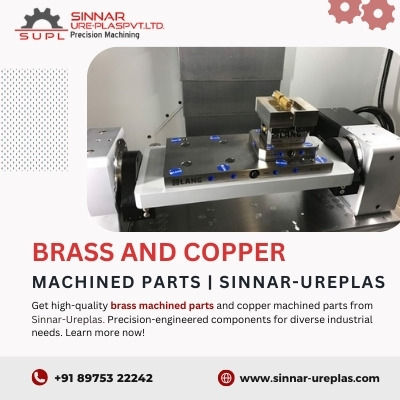
Why Brass and Copper?
Not all metal is the same. Each alloy has a signature, a distinct set of characteristics that qualify it for a particular use. A combination of copper and zinc, brass has both strength and beauty. It withstands pressure, machines like a dream, and is corrosion resistant. Conversely, copper is a purist's choice due to its unparalleled electrical and thermal conductivity.
These metals are catalysts for innovation rather than only being raw materials.
Brass Machined Parts: Beyond Aesthetics
Decorative hardware or antique fittings are frequently the first things that come to mind when people think of brass. In the realm of precision machining, however, Brass Machined Parts are all about performance. Here’s why industries love them:
Non-sparking and durable – ideal for safety-critical environments
Low friction – perfect for gears, valves, and rotating components
Corrosion-resistant – especially in plumbing and marine industries
Smooth machining – allows for tight tolerances and sharp detailing
From sensor housings to threaded inserts, brass continues to prove its worth in applications where aesthetics and functionality go hand-in-hand.
Copper Machined Parts: Power in Purity
Copper may be soft, but its applications are nothing short of powerful. Copper Machined Parts are essential in:
Electrical systems
Solar panels
Heat exchangers
Communication equipment
Because of its high conductivity, there is less energy loss and a quicker reaction. It is a preferred material for medical equipment due to its antibacterial qualities. Its thermal performance in power units and heat sinks is unparalleled. Performance is ingrained in copper at the atomic level.
What Makes Sinnar Ureplas Different?
We are precise partners, not just a machine shop. combines decades of experience with state-of-the-art technology to produce Copper Machined Parts that not only fulfill but surpass expectations
Global Quality, Made in India
Our clientele includes Middle Eastern HVAC brands and European electrical companies. Why? because we provide components that meet global standards, whether they be REACH certification, RoHS compliance, or ISO tolerances.
CNC Machining with a Human Touch
The newest CNC turning, milling, and finishing equipment is available at our location in Sinnar, Maharashtra. However, our engineers, designers, and machinists make sure that every part fulfills your vision, not just a specification sheet..
From Blueprint to Box
We take care of everything, from design optimization to full-scale production and final inspection, whether you bring us a crude drawing or a comprehensive CAD file. We enjoy resolving challenging engineering issues. That's what we do..
Sustainability is Not an Afterthought
Copper and brass are two of the most recyclable metals in the world. We employ a zero-waste machining approach, which includes recovering metal chips, maximizing material utilization, and adhering to environmentally friendly procedures across our production line.
Additionally, our goods are long-lasting, which minimizes the need for frequent replacements and the environmental impact on our customers.
Custom, Not Commodity
Off-the-shelf is fine for some. But in industries where safety, speed, and precision are non-negotiable, custom machined parts make all the difference.
We specialize in:
Low-to-high volume runs
Tight tolerance machining (as low as ±0.005mm)
Plating, polishing, heat treatment, and assembly
Threading, knurling, and special finishing processes
Every project starts with understanding your needs—and ends with exceeding your expectations.
Let’s Build Something Precise Together
If you need Brass Machined Parts or Copper Machined Parts that deliver on quality, speed, and reliability—look no further than. We’re proud to be one of India’s trusted suppliers to industries that run on precision.
Precision isn’t just about tight tolerances. It’s about understanding the purpose behind every part. At Sinnar Ureplas, we turn raw metals into reliable components that support industries, enable innovations, and power progress—globally.
Trust us to be more than your supplier. Let us be your machining partner.
Visit: https://sinnar-ureplas.com/copper-brass-machined-parts.php
Contact: +91 8975322242
0 notes
Text
Crafting Precision: Custom Brass & Copper Machined Parts from Sinnar Ureplas
Discover high-precision Brass and Copper Machined Parts tailored to global industries. Sinnar Ureplas delivers quality, reliability, and innovation in every component. Explore now.
Shaping Metal Into Precision: The Art of Brass & Copper Machined Parts
The components you select can determine the strength of your product in a society that values efficiency, creativity, and attention to detail. Precision is crucial in everything from the smallest electrical contact to a crucial fuel system valve. It is a name that is associated with quality, and that is where it comes in. Brass Machined Parts and Copper Machined Parts manufacturing in India.
However, why are copper and brass so crucial to precision machining? And why do businesses all around the world rely on Sinnar Ureplas for these essential parts? Let's explore the technique, the metal, and the skill.
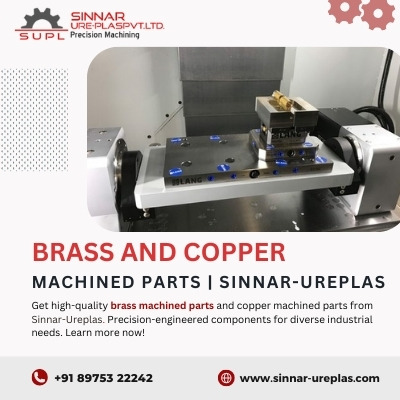
Why Brass and Copper?
Not all metal is the same. Each alloy has a signature, a distinct set of characteristics that qualify it for a particular use. A combination of copper and zinc, brass has both strength and beauty. It withstands pressure, machines like a dream, and is corrosion resistant. Conversely, copper is a purist's choice due to its unparalleled electrical and thermal conductivity.
These metals are catalysts for innovation rather than only being raw materials.
Brass Machined Parts: Beyond Aesthetics
Decorative hardware or antique fittings are frequently the first things that come to mind when people think of brass. In the realm of precision machining, however, Brass Machined Parts are all about performance. Here’s why industries love them:
Non-sparking and durable – ideal for safety-critical environments
Low friction – perfect for gears, valves, and rotating components
Corrosion-resistant – especially in plumbing and marine industries
Smooth machining – allows for tight tolerances and sharp detailing ,. M
From sensor housings to threaded inserts, brass continues to prove its worth in applications where aesthetics and functionality go hand-in-hand.
Copper Machined Parts: Power in Purity
Copper may be soft, but its applications are nothing short of powerful. Copper Machined Parts are essential in:
Electrical systems
Solar panels
Heat exchangers
Communication equipment
Because of its high conductivity, there is less energy loss and a quicker reaction. It is a preferred material for medical equipment due to its antibacterial qualities. Its thermal performance in power units and heat sinks is unparalleled. Performance is ingrained in copper at the atomic level.
What Makes Sinnar Ureplas Different?
We are precise partners, not just a machine shop. combines decades of experience with state-of-the-art technology to produce Copper Machined Parts that not only fulfill but surpass expectations
Global Quality, Made in India
Our clientele includes Middle Eastern HVAC brands and European electrical companies. Why? because we provide components that meet global standards, whether they be REACH certification, RoHS compliance, or ISO tolerances.
CNC Machining with a Human Touch
The newest CNC turning, milling, and finishing equipment is available at our location in Sinnar, Maharashtra. However, our engineers, designers, and machinists make sure that every part fulfills your vision, not just a specification sheet..
From Blueprint to Box
We take care of everything, from design optimization to full-scale production and final inspection, whether you bring us a crude drawing or a comprehensive CAD file. We enjoy resolving challenging engineering issues. That's what we do..
Sustainability is Not an Afterthought
Copper and brass are two of the most recyclable metals in the world. We employ a zero-waste machining approach, which includes recovering metal chips, maximizing material utilization, and adhering to environmentally friendly procedures across our production line.
Additionally, our goods are long-lasting, which minimizes the need for frequent replacements and the environmental impact on our customers.
Custom, Not Commodity
Off-the-shelf is fine for some. But in industries where safety, speed, and precision are non-negotiable, custom machined parts make all the difference.
We specialize in:
Low-to-high volume runs
Tight tolerance machining (as low as ±0.005mm)
Plating, polishing, heat treatment, and assembly
Threading, knurling, and special finishing processes
Every project starts with understanding your needs—and ends with exceeding your expectations.
Let’s Build Something Precise Together
If you need Brass Machined Parts or Copper Machined Parts that deliver on quality, speed, and reliability—look no further than. We’re proud to be one of India’s trusted suppliers to industries that run on precision.
Precision isn’t just about tight tolerances. It’s about understanding the purpose behind every part. At Sinnar Ureplas, we turn raw metals into reliable components that support industries, enable innovations, and power progress—globally.
Trust us to be more than your supplier. Let us be your machining partner.
Visit: https://sinnar-ureplas.com/copper-brass-machined-parts.php
Contact: +91 8975322242
0 notes
Text
Brass Knurling Insert Manufacturer in India
Are you searching for top notch brass knurling insert manufacturer in India? RMS Precision Products is a leading brass inserts manufacturer in India. We offer high quality threaded inserts, brass inserts for plastics, knurling inserts, and custom metal insert fasteners designed for durability and precision. Our products ensure secure, long-lasting fastening solutions for industries like automotive, electronics, and plastic molding. Whether you need standard or custom threaded inserts for plastics, we deliver superior quality with strict adherence to international standards.
0 notes
Text
Order Custom Brass Inserts from Vertex Metalcrafts Today
Enhance product reliability with precision Brass Inserts from Vertex Metalcrafts! Our Brass Inserts are ideal for plastics, wood, and metal applications, ensuring secure, long-lasting threads. We offer a variety of shapes, sizes, and knurling options for superior grip and performance. At Vertex Metalcrafts, quality is a priority—every Brass Insert is manufactured to international standards. Choose our expertly engineered Brass Inserts for better assembly integrity and mechanical strength across electronics, automotive, and industrial sectors.
Brass Inserts

0 notes
Photo
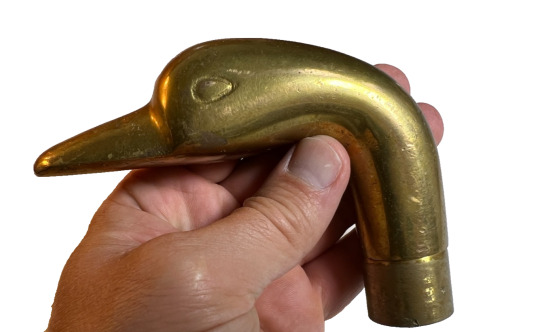
Vintage Antique Brass Duck Head Cane / Umbrella Handle Top Walking Stick Topper
Antique - Vintage
Brass
Weighted inside with sand and sealed w/Wax
Has threads inside and/or enough room available to insert a wooden insert.
Some mild scuffs and blemishes (see pics).
22.3 mm W Opening (0.88 in)
20.41 mm T Collar (0.80 in)
88.64 mm T Overall (3.49 in)
113.82 mm L Overall (4.48 in)
0 notes
Text
Double Acting Hydraulic Cylinder Manufacturer
Understanding Double Acting Hydraulic Cylinder Manufacturing
Hydraulic systems are fundamental to modern industry, enabling machines to exert powerful and precise mechanical force through the use of pressurized fluid. Among the many components of these systems, double acting hydraulic cylinders play a critical role in ensuring smooth and controlled movement in both directions. For anyone involved in industries like construction, manufacturing, agriculture, or automation, understanding how these cylinders are designed and manufactured offers insight into the durability, efficiency, and performance of the machines they power.
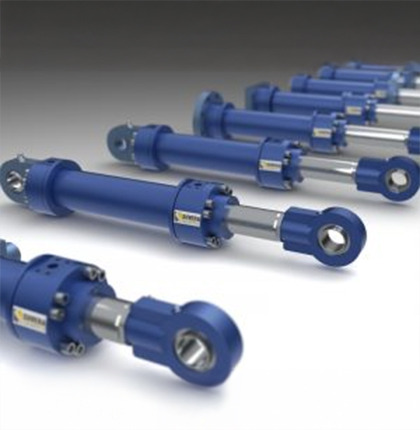
What Is a Double Acting Hydraulic Cylinder?
A hydraulic cylinder converts hydraulic energy (fluid pressure) into mechanical energy (force and movement). A double acting cylinder is a type of hydraulic actuator where pressure is applied to both sides of the piston, allowing it to extend and retract with hydraulic power. Unlike single acting cylinders, which rely on gravity or a spring to return the piston to its original position, double acting cylinders offer powered movement in both directions, providing better control and force for a wide range of applications.
Core Components of Double Acting Cylinders
Before delving into the manufacturing process, it's useful to understand the essential parts of a double acting hydraulic cylinder:
Piston rod: Connected to the piston and extends outside the cylinder to perform mechanical work.
End caps (heads): Seal the cylinder and hold components in place.
Seals: Prevent fluid leakage and maintain pressure.
Ports: Inlet and outlet for hydraulic fluid on both ends.
Each of these components must be engineered with precision and constructed using materials capable of withstanding high pressures and long-term use.
The Manufacturing Process
Manufacturing a double acting hydraulic cylinder is a complex and precise process. It requires a combination of material science, machining accuracy, and engineering expertise.
1. Material Selection
High-quality materials form the foundation of reliable hydraulic cylinders. The most commonly used materials include:
Carbon steel: Popular for cylinder barrels and rods due to strength and machinability.
Alloy steel or stainless steel: Used when corrosion resistance or extra durability is required.
Bronze or brass: Often used for bushings or wear rings.
The choice of materials impacts the cylinder’s resistance to wear, pressure, temperature extremes, and environmental corrosion.
2. Precision Machining
Each component must be manufactured to tight tolerances. Machining processes include:
Boring and honing: The internal surface of the barrel must be honed to a mirror finish to reduce friction and ensure proper seal operation.
CNC turning and milling: Used to shape the piston, rod, and end caps.
Threading and port drilling: To ensure correct attachment and fluid control.
Advanced computer-controlled machines ensure consistency, accuracy, and repeatability—critical for industrial-grade cylinders.
3. Heat Treatment and Surface Finishing
To improve strength and surface durability:
Heat treatment may be applied to the piston rod to enhance hardness and resistance to wear.
Chrome plating or nickel coating is often used on the piston rod to resist corrosion and provide a smooth surface for seals.
Surface finishing is not just for appearance; it directly affects the performance and lifespan of the cylinder.
4. Assembly
After machining and finishing, components are carefully assembled. This process involves:
Inserting the piston into the barrel.
Attaching the piston rod.
Installing seals and wear rings.
Closing the cylinder with end caps and torquing them to specification.
Cleanroom conditions may be used during assembly to prevent contamination that could damage seals or reduce cylinder life.
5. Testing and Quality Control
Pressure testing: To ensure the cylinder can handle the specified operating pressure.
Leak testing: To verify seal integrity.
Stroke and alignment checks: To ensure smooth operation across the full range of motion.
High-quality manufacturers document test results and may offer certifications based on international standards (such as ISO or ANSI).
Key Considerations for Buyers
When sourcing double acting hydraulic cylinders, end-users and OEMs (Original Equipment Manufacturers) should consider the following:
Application-specific design: Cylinders can be customized for stroke length, bore size, pressure ratings, and mounting options.
Material compatibility: Choose materials based on environmental exposure (e.g., marine, mining, or chemical environments).
Cycle frequency and load: The expected workload will affect the choice of seals, finishes, and tolerances.
Serviceability: Easy maintenance, seal replacement, and part availability can reduce downtime and lifecycle costs.
Reputable manufacturers also provide technical support, CAD models for system design, and post-sale services like repair and rebuilding.
Trends in Hydraulic Cylinder Manufacturing
As with many mechanical components, hydraulic cylinders are evolving:
Smart cylinders: Integration with sensors for position, pressure, and temperature monitoring enables predictive maintenance and enhanced automation.
Eco-friendly designs: Reducing leakage, improving energy efficiency, and using recyclable materials are becoming more important.
Additive manufacturing: 3D printing of non-load-bearing components is being explored for prototyping and small runs.
These advancements are pushing manufacturers to combine traditional expertise with modern technologies to meet the demands of next-generation machinery.
Conclusion
These cylinders are essential components in countless applications, enabling bidirectional mechanical movement with control and power. For businesses relying on hydraulic systems, understanding how these cylinders are built helps in selecting the right product for performance, durability, and long-term reliability.
As industries continue to advance, the role of hydraulic technology—and the manufacturers who build its core components—remains as vital as ever.URL: For more information, visit Suvera Fluid Power: Double Acting Hydraulic Cylinder Manufacturer
0 notes
Text
Knife Handle Rivets: Strength, Stability, and Style for Your Blades
When it comes to building or repairing knives, the handle is just as important as the blade. A well-made handle not only ensures comfort and control, but it also provides durability for years of use. One of the key components in achieving a secure, long-lasting knife handle is the use of knife handle rivets.
These small yet crucial fasteners hold the handle scales (usually made of wood, micarta, bone, or G10) tightly to the tang of the knife. Whether you're a professional knife maker or a DIY enthusiast, choosing the right rivets can make all the difference in both performance and appearance.
What Are Knife Handle Rivets?
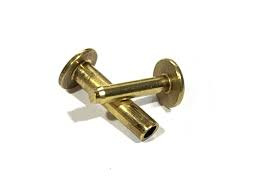
Knife Handle Rivets are mechanical fasteners used to attach handle materials (also known as scales) to the tang of a full-tang knife. Rivets typically consist of two parts that are inserted through pre-drilled holes in the handle and peened or pressed together to form a permanent, secure connection.
Rivets come in various materials, styles, and sizes to match the functionality and design of your knife.
Common Types of Knife Handle Rivets
Brass Rivets
Classic look, corrosion-resistant, and easy to work with.
Ideal for traditional or decorative knife builds.
Stainless Steel Rivets
Extremely durable and rust-resistant.
Perfect for kitchen and outdoor knives.
Aluminum Rivets
Lightweight and corrosion-resistant.
Good choice for knives where weight matters.
Mosaic Pins
Decorative rivets featuring intricate patterns.
Used to add custom, artistic touches to high-end knives.
Loveless Bolts
Threaded bolts with internal nuts; provide very strong, mechanical fastenings.
Reusable and ideal for heavy-duty knives.
Benefits of Using Rivets in Knife Handles
✅ Secure Fastening – Rivets provide a strong mechanical bond between the tang and handle scales. ✅ Durability – Properly installed Cutlery Rivets can last the lifetime of the knife. ✅ Aesthetic Appeal – Available in a variety of finishes and decorative styles to enhance your knife’s design. ✅ Customisation – Easily adaptable to different handle materials and shapes. ✅ Ease of Use – Ideal for both professionals and hobbyists, especially with basic metalworking tools.
How to Install Knife Handle Rivets
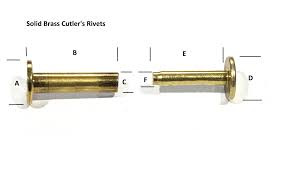
Drill Alignment Holes – Ensure the tang and scales are properly drilled to fit the rivet diameter.
Insert the Rivet – Place the rivet through the handle material and tang.
Secure the Fit – Peen, press, or tighten (depending on rivet type) to create a snug bond.
Finish the Handle – Sand and polish the handle flush with the rivet head for a smooth, seamless feel.
Pro tip: Always choose rivet length based on handle thickness plus a little extra for peening or tightening.
FAQs About Knife Handle Rivets
Q1: Can I reuse knife handle rivets? A: Most rivets are meant to be permanent. However, Loveless bolts or Corby bolts are removable and can be reused if needed.
Q2: What size rivets do I need for knife handles? A: Common sizes range from 1/8” to 1/4” in diameter, depending on the knife size and handle thickness.
Q3: Are rivets better than epoxy alone? A: Yes. While epoxy provides a strong adhesive bond, rivets add mechanical strength and long-term durability, especially under stress or moisture exposure.
Q4: Can I use decorative rivets on a functional knife? A: Absolutely. Mosaic pins, for example, offer both strength and visual appeal. Just ensure the material is durable enough for your knife’s intended use.
Q5: What tools are needed to install knife handle rivets? A: Basic tools include a drill press or hand drill, hammer (for peening), clamps, and sanding/polishing equipment.
Conclusion
Knife handle rivets are a vital component in both the construction and restoration of knives. They provide mechanical strength, ensure the handle stays securely in place, and can even enhance the visual appeal of your finished product. Whether you’re building a custom hunting knife or upgrading a kitchen blade, selecting the right type of rivet ensures a longer-lasting, more reliable tool.
0 notes
Text
Brass Insert Manufacturer and Supplier in Jamnagar India
A brass threaded inserts are used in different types of materials such as plastic injection molding, wood, aluminum, ultrasonic, pre-heat and press-in molding. GK Metals is the best brass insert manufacturer in Jamnagar, India. Contact us with your requirements.
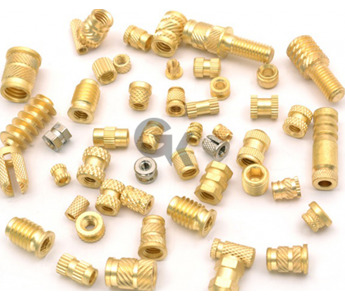
#brass insert#brass insert manufacturer#brass insert manufacturer in jamnagar#brass inserts supplier#brass inserts for plastic injection molding#brass threaded inserts for wood#brass knurling inserts#brass hexagonal inserts
0 notes
Text





Absolutely — here’s a solid write-up of your exhaust manifold stud repair and upgrade that you can proudly post. It highlights both the technical detail and your hands-on ingenuity:
⸻
🛠️ Custom Exhaust Manifold Repair / Upgrade – DIY Engineering
Had to deal with a stripped-out exhaust manifold on a Chinese scooter (Tank 200), so here’s the full custom hardware breakdown and fix:
🔩 Stud & Nut Setup:
• M10 x 1.5 Custom Stud:
Cut from a high-strength grade 10.9 bolt using a hacksaw; fits snugly into the manifold after drilling and tapping the hole.
• M8 x 1.25 Factory Stud:
Ordered online (from a Volkswagen/car parts site) — high-quality hardened metal that just happened to match the size and threading I needed.
🔧 Locking Hardware:
• Prevailing Torque Lock Nuts (for both M10 and M8):
These are all-metal lock nuts with a deformed thread at the top, no nylon insert — ideal for high-heat environments like exhaust systems.
• Split Lock Washers (for both sizes):
Added extra vibration resistance. May be redundant with prevailing nuts, but better safe than sorry.
🔥 Gasket:
• Brass Ring / Metal Exhaust Gasket:
Classic crush-style metal ring gasket — seats well, handles heat, and helps seal the connection at the flange.
🛠 Modifications:
• Slightly widened the flange holes to accommodate the new M10 stud.
• Hand-torqued everything snug but not overtight — went by feel since I don’t have a torque wrench.
• Waiting to see how it holds up through heat cycles and after I refuel — but so far, it’s sealed and solid.
⸻
Conclusion:
#mechaniclife #scooterfix #customstud #exhaustrepair #bushmechanic #diyengineering #M10 #M8 #prevailingtorque #metalhead
DIY manifold repair with a mix of ingenuity, metric thread knowledge, and parts sourcing. No torque wrench, just feel. No kit — just real tools, real mods. We’ll see how long it holds, but right now, it’s holding tight and leak-free.
⸻
Let me know if you want it shortened or tailored more to a specific audience (mechanics, scooter forums, etc.).
0 notes
Text
PPR Male Threaded Elbow
PPR Male Threaded Elbow fitting is a combination of a 90-degree plastic elbow and male threaded brass inserts, is used to connect two pipes in different directions, one end is PPR plastic, and the other end is a male threaded metal with NPT or BSP standard, allowing for the connection of PPR pipes and metal pipe or metal fittings. ZHSU PPR Male Threaded Elbow adopts 100% virgin PPR material and high-quality nickel-plated brass inserts which have the advantage of rust resistance, heavy-weight brass inserts, easy construction, and changing pipe direction, being widely used in hot and cold water systems, purified water supply system, central air-conditioning system, solar energy water supply pipelines, etc.
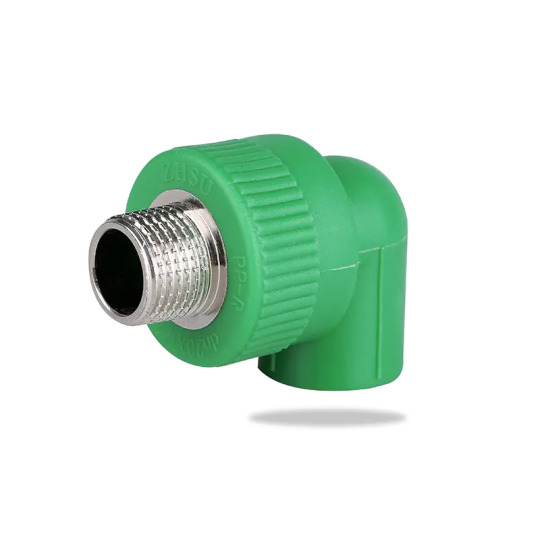
0 notes
Text
Hydraulic Pipe Compression Fitting: Reliable Connections for High-Pressure Systems
Hydraulic systems rely on robust, leak-proof connections to function efficiently under high pressure. One of the most dependable solutions for connecting hydraulic pipes is the hydraulic pipe compression fitting. These fittings are essential components in fluid power applications across various industries, ensuring a secure and tight seal without the need for welding or soldering.
What is a Hydraulic Pipe Compression Fitting?
A hydraulic pipe compression fitting is a mechanical connector used to join sections of pipe or tubing in hydraulic systems. It works by compressing a metal ferrule against the pipe or tube as a nut is tightened, creating a strong and leak-free connection.
Key Components of a Compression Fitting
Body: The main part of the fitting where the pipe inserts.
Ferrule(s): Metal rings that deform under pressure to form a tight seal around the pipe.
Nut: The component that compresses the ferrule onto the pipe when tightened.
Features of Hydraulic Compression Fittings
Leak-Proof Seal: Provides a secure, tight connection even under high pressures.
Easy Installation: No need for special tools, welding, or threading.
Reusable: Many compression fittings can be disassembled and reused.
Vibration Resistant: Maintains seal integrity in systems prone to vibration.
Corrosion Resistant: Often made from stainless steel, brass, or coated carbon steel to withstand harsh environments.
Applications of Hydraulic Pipe Compression Fittings
Industrial Machinery: For transmitting hydraulic fluid in presses, pumps, and cylinders.
Construction Equipment: Used in excavators, loaders, and cranes for fluid power transmission.
Automotive and Aerospace: In brake lines, fuel systems, and hydraulically actuated components.
Agricultural Machinery: Ensures efficient hydraulic function in tractors and harvesters.
Marine and Offshore Systems: Used in hydraulic steering and engine systems in corrosive environments.
Types of Hydraulic Compression Fittings
Single Ferrule Fittings: Common in low to medium pressure systems.
Double Ferrule Fittings: Provides extra sealing and holding power in high-pressure systems.
Straight, Elbow, and Tee Fittings: Available in various shapes to accommodate complex piping layouts.
Material Options
Stainless Steel: Ideal for high-pressure and corrosive environments.
Brass: Used in lower-pressure or non-corrosive applications.
Carbon Steel: Common in industrial applications for its strength and cost-effectiveness.
Benefits of Using Compression Fittings in Hydraulic Systems
Time-Saving Installation
No Need for Heat or Threading
Compact and Space-Saving
Minimal Maintenance
Versatile for Various Pipe Sizes and Materials
Choosing the Right Fitting
To select the correct hydraulic pipe compression fitting, consider:
Pipe/tube material and size
Operating pressure and temperature
Type of hydraulic fluid
Environmental conditions (corrosion, vibration, etc.)
Required flow rate and system layout
Maintenance Tips
Always check for wear or corrosion before reassembly.
Ensure proper torque when tightening the nut to avoid under- or over-compression.
Replace worn ferrules to maintain sealing efficiency.
Final Thoughts
hydraulic pipe compression fitting are crucial components in maintaining the integrity and performance of hydraulic systems. Their ease of use, reliability under pressure, and adaptability make them the go-to solution for many engineers and technicians. Whether in manufacturing, construction, or transportation, these fittings help ensure seamless fluid flow and system safety.
0 notes
Text
What are camlock couplings?

Camlock couplings or cam and groove couplings are quick disconnect couplings which may be used for fast disconnection and connection of hoses and pipes and may be easily and rapidly connected or disconnected. Easy to make and simple, camlock couplings have widespread applications in oil & gas, food processing, water transportation, chemical transfer, and agriculture.
Camlock couplings are clamp-free, tool-free, and process-free and enable the transfer of fluid faster, safer, and better.
How Camlock Couplings Function?
Camlock couplings consist of two principal parts:
Male adapter (groove) – Popped into the other half
Female coupler (cam) – Fitted with arms (cams) which lock over the adapter
To connect:
Insert the male adapter into the female coupler.
Pull down the two cam arms on the coupler.
This will be safely held in place, forming a leak-tight seal.
Closing:
Force the two cam arms to close off the adapter.
The process takes mere seconds—the screwdrivers and wrenches need not be touched.
Camlock Coupling Types
Several types of Camlock couplings (classed from A to F) exist. A few of the most ubiquitous amongst these are named below:
Type A: Male adapter having a female thread attached
Type B: Female coupler with male thread on it
Type C: Female coupler with hose tail
Type D: Female coupler with female thread
Type E: Male adapter with hose tail
Type F: Male adapter with male thread
Others include dust caps (Type DC) and dust plugs (Type DP) for covering the lines when not in use.
Materials Used in Camlock Couplings
Camlock couplings consist of a wide range of materials for different uses:
Aluminum – Corrosion-proof and light in weight; on fuel and water.
Stainless Steel – Hard and chemical-resistant; ideal for industrial applications, particularly where heavy-duty.
Brass – Application in petroleums and coolants.
Polypropylene and Nylon – Chemical-resistant and light in weight; suited for agri- or light-duty fluid transfer.
Practical Advantages of Camlock Coupling Use
Simple and Easy to Manage: Uncoupling and coupling are not tool-dependent processes.
Flexible: Suitable for a wide variety of liquids, gases, and powders.
Tough: Provides heavy-duty material options for abusive applications.
Seal-Lock Leak-Resistant: Secure seal prevents spills and eliminates the possibility of leaks.
Cost Saving: Saves time on labor and reduces downtime for operations.
Applications
Camlock couplings find uses in a variety of industries, including:
Agriculture – Irrigation systems, water pumping, and fertilizer transfer.
Oil & Gas – Oil transfers, fuel supply.
Food & Beverage – Sanitary fluid transfer of liquids and powders.
Chemical Handling – Transfer of acids, solvents, and other chemicals.
Construction – Provision of water for use on-site.
Safety & Maintenance Tip
Be sure to utilize the appropriate kind and type of material for the fluid or material conveyed.
Regularly inspect for wear, corrosion, or leakage.
Do not overtighten cam arms; locking is designed in.
Apply dust plugs and caps when decoupling for dusting and shielding.
Conclusion
Camlock couplings offer a fast, secure, and safe way to connect piping and hoses in most industries. Their simple cam-and-groove shut-off design, along with choosing from available materials, is rendering them the top choice for firms wanting to simplify fluid management.
Whether working together with a chemical plant or installing an irrigation system, camlock couplings can make your work easier—one click at a time.
0 notes
Text
Custom-Fit Solutions for Modern Mechanical and Electrical Systems
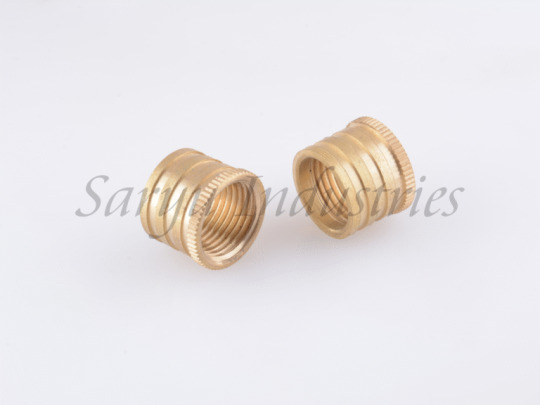
As industries evolve, so do their requirements for components that are not only functional but precisely tailored to fit advanced designs. Today’s mechanical and electrical systems demand parts that align with tighter tolerances, specific installation needs, and increasingly compact layouts. That’s where custom-fit solutions come into play — and at Saryu Industries, it’s what we do best.
Our high-performance Brass Inserts are crafted to meet exact client specifications, making them the ideal choice for modern applications that require seamless integration, mechanical stability, and electrical reliability.
Precision Where It Matters Most
Tailor-Made to Specification We manufacture inserts in custom sizes, threading styles, and surface finishes to suit unique design and functional requirements.
Engineered for Compatibility Whether they’re going into plastic components, metal panels, or composite enclosures, our brass inserts ensure a secure and long-lasting fit.
Performance Under Pressure Built to resist vibration, corrosion, and heat, our components thrive in harsh industrial environments and complex electrical setups.
Streamlined Installation Designed for press-fit, heat-fit, ultrasonic, or molded-in applications, our inserts help reduce assembly time and improve product durability.
Trusted Manufacturing with Proven Expertise
With decades of experience and a deep understanding of industrial challenges, Saryu Industries has become one of the most dependable brass manufacturers in India. Our facilities are equipped with modern machinery and a skilled team that delivers high-volume production without compromising on quality.
We also specialize in manufacturing Brass Pins, essential for reliable electrical contact in plug systems, circuit boards, terminals, and switchgear.
Operating from the core of brass industries Jamnagar, we benefit from a robust local ecosystem of skilled talent, quality raw materials, and streamlined logistics — enabling us to serve clients across India and overseas efficiently.
Versatility Meets Precision
Our Brass Inserts support everything from smart electronics to mechanical couplings and control panels. Whether you're an OEM looking for volume consistency or a designer in need of prototype precision, our components adapt to your system — not the other way around.
Let’s Build Something That Fits
Looking for components engineered for your system, not the shelf? Contact us today to explore how our custom-fit Brass Inserts and precision components can help you build stronger, smarter, and more reliable solutions.
Contact Us to discuss your project.
0 notes